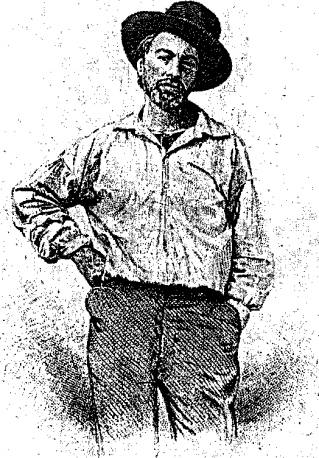LITR 5734:
Colonial & Postcolonial Literature

Student Poetry Presentation 2005
Poetry
reading from Whitman's "Passage to India"
Reader: Jennifer Fregia

Walt
Whitman
1819-1892
http://www.whitmanarchive.org/
Whitman showed in
his works strong ties to Transcendentalism, a philosophy (connected in America
with Emerson) that stated that there is a divinity inherent in all humanity. It
is generally connected with democracy and individualism, and teaches the dignity
of manual labor and strong ties to nature.
The American
“I”
"Passage
to India"
Kimberly Jones-2001:
Walt Whitman’s "Passage to India" focuses on the physical and
spiritual connectedness that must occur between Eastern and Western ideologies
in order to achieve a sense of oneness or unity among people.
The specific
passage that Whitman speaks of is probably the Suez Canal, which opened in 1869.
- Whitman
speaks of modern engineering marvels, and honors the past upon which they
are built.
- Whitman
joins the role of modern science to the folk tales and wisdom of the various
cultures of the world. He believes that this universal connection (dialogue)
between all the countries and cultures of the world is part of mankind’s
destiny, and honors those that brought these countries together.
- In
this section Whitman narrates a trip across America by train. This journey
shows a part of what he envisions as man’s journey from the eastern to the
western hemisphere as the world is joined together by technological
achievements.
- Whitman
again pauses to remember those who helped to realize the achievement of a
unified globe.
- In this section Whitman moves away from a literal connection between countries to a wider spiritual connection. He states that since Adam and Eve lived, the inclination of man has been to explore and widen his boundaries in a search for the peace that was lost. Now that the world has been connected the time has come for a world poet. People will be joined to each other and then joined to Nature as well.
- This section again shows the present as the completion of the past, the realization of the goal of many men who spent their lives pursuing this dream. It chronicles in particular the life of Columbus.
- Whitman sees India in particular as a land of earth’s innocence. He seeks to revitalize this ‘early paradise’ with the emergence of a world poet.
- With this section Whitman begins to veer off from his original theme of connecting the globe and move from a focus on the past and present to the future. He uses the language of exploration not limited to our own earth, but passing into the realm of the moon, sun, and stars. This is a metaphor for moving into a higher sphere of wisdom.
- Whitman continues in his metaphorical pursuit of wisdom, pulling the language back down to that of the earth.
For
Discussion:
Does Whitman fall
into the error that Achebe points out in his essay “An Image of Africa,”
(“the young fellow from Yonkers…is obviously unaware that the life of his
own tribesmen…is full of odd customs and superstitions”) by thinking that he
must travel to India in order to find “myths and fables of eld”?
How does this
poem contrast to the poetry of Walcott and the division/tension he finds between
opposing cultures?
To what degree is unification reached by assimilation?
|
|
|
|
|



